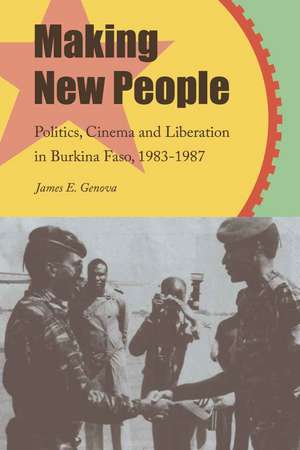Making New People: Politics, Cinema, and Liberation in Burkina Faso, 1983–1987
Autor James Genovaen Limba Engleză Paperback – noi 2022
Preț: 274.83 lei
Nou
Puncte Express: 412
Preț estimativ în valută:
52.59€ • 55.30$ • 43.45£
52.59€ • 55.30$ • 43.45£
Carte disponibilă
Livrare economică 27 martie-10 aprilie
Livrare express 12-18 martie pentru 44.58 lei
Preluare comenzi: 021 569.72.76
Specificații
ISBN-13: 9781611864397
ISBN-10: 1611864399
Pagini: 268
Dimensiuni: 152 x 229 x 23 mm
Greutate: 0.4 kg
Editura: Michigan State University Press
Colecția Michigan State University Press
ISBN-10: 1611864399
Pagini: 268
Dimensiuni: 152 x 229 x 23 mm
Greutate: 0.4 kg
Editura: Michigan State University Press
Colecția Michigan State University Press
Recenzii
“Making New People: Politics, Cinema, and Liberation in Burkina Faso, 1983–1987 is intellectually engaging, compelling, and well crafted. James E. Genova’s book is an authoritative cultural history of Thomas Sankara’s historic revolution in Burkina Faso.”
—OLUFEMI O. VAUGHAN, Alfred Sargent Lee ’41 and Mary Farley Ames Lee Professor of Black Studies, Amherst College, and author, Religion and the Making of Nigeria
—OLUFEMI O. VAUGHAN, Alfred Sargent Lee ’41 and Mary Farley Ames Lee Professor of Black Studies, Amherst College, and author, Religion and the Making of Nigeria
Notă biografică
JAMES E. GENOVA is professor of history and film studies at Ohio State University at Marion. He is the author of Colonial Ambivalence, Cultural Authenticity, and the Limitations of Mimicry in French-Ruled West Africa, 1914–1956 (2004) and Cinema and Development in West Africa (2013).
Descriere
On August 4, 1983, Captain Thomas Sankara led a coalition of radical military officers, communist activists, labor leaders, and militant students to overtake the government of the Republic of Upper Volta. Almost immediately following the coup’s success, the small West African country—renamed Burkina Faso, or Land of the Dignified People—gained international attention as it charted a new path toward social, economic, cultural, and political development based on its people’s needs rather than external pressures and Cold War politics. James E. Genova’s Making New People: Politics, Cinema, and Liberation in Burkina Faso, 1983–1987 recounts in detail the revolutionary government’s rise and fall, demonstrating how it embodied the critical transition period in modern African history between the era of decolonization and the dawning of neoliberal capitalism, and revealing the key role of film in the revolution’s efforts to raise people’s consciousness.
